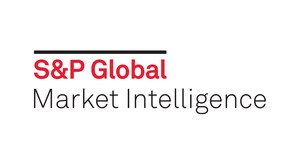NEW YORK, Feb. 10, 2021 /PRNewswire/ -- Last year's favorable market conditions for companies in the U.S. financial technology (fintech) sector are likely to continue throughout 2021, according to S&P Global Market Intelligence's annual Fintech Market Report. The new report concludes that the fintech sector not only weathered the storm of the COVID-19 pandemic in 2020, but many subsectors benefited from it, due to an increased use of digital channels by consumers.
Published by S&P Global Market Intelligence's Financial Institutions Group (FIG) Research team, this report spotlights the current state of digital distribution and fintech. The report found that changes in consumer behavior driven by the COVID-19 pandemic led to favorable conditions for the fintech sector. This included surges in demand for digital insurance brokers, mobile banking, and more. Coupled with an ample supply of venture capital and the potential for more IPOs and mergers, the positive trajectory for the sector is expected to remain.
"By now, the fintech sector is probably on everyone's radar, but the extent to which customers continue to use digital channels after the pandemic passes remains to be seen," said Thomas Mason, Senior Research Analyst for FIG at S&P Global Market Intelligence. "At the very least, the pandemic has put a spotlight on both the strengths and weaknesses of digital distribution, offering a stress test of the scalability and fault tolerance of these systems. We expect increased digital adoption and the one-stop-shop model to be key themes in 2021, as well as robust IPO and M&A activity in the space."
Key highlights from the report include:
- Digital investing: The economic impact of COVID-19 provided a clear windfall to online brokers as U.S. retail investors that already had accounts traded much more heavily, and first-time investors jumped into the action. Charles Schwab, E*TRADE and TD Ameritrade together boosted new accounts in 2020 by 316% in the first quarter and 197% in the second quarter.
- Digital lending: The pandemic has been the most significant shock to the non-bank digital lending industry in the past 10 years. Origination volume in the first three quarters of 2020 declined 36% year-over-year across a core group of companies focused on personal lending, small and medium-sized enterprises lending, and student lending.
- Insurtech: The insurtech space has been largely unfazed by the pandemic, with many startups still able to grow rapidly, secure venture capital and go public. The creation of insurtech companies that both sell and underwrite policies (a.k.a. full stack) accelerated in 2020, with five property and casualty companies either forming a carrier or announcing the acquisition of one, up from three in 2019 and one in 2018.
- Mobile banking: Customers have increasingly turned to their mobile bank apps for basic banking services since the outbreak of COVID-19, forcing institutions to rapidly adjust digital strategies to fill gaps in their offerings. S&P Global Market Intelligence's 2020 U.S. mobile banking survey found that nearly 58% of respondents indicated that they visited branches less frequently after the COVID-19 outbreak began in the U.S. Overall, 44% of respondents to the survey indicated that they leaned on their mobile banking apps more frequently as a result of the pandemic.
- Mobile payments: The COVID-19 pandemic has boosted mobile payment adoption in the U.S. and led to record growth among multiple nonbank payment providers. Square's Cash App saw funds stored in-app grow from $945 million to $1.3 billion in the month of April. PayPal saw net new active accounts nearly double from 3.9 million to 7.4 million in the same month. Both businesses experienced significant growth in users and transaction activity in the months following the initiation of the pandemic.
To request a copy of the 2021 Fintech Market Report, please contact [email protected].
S&P Global Market Intelligence's FIG Research team provides independent forecasts and real-time analysis of the banking, insurance and financial technology sectors, across multiple geographies, leveraging the deep sector knowledge of its analysts. The FIG offering complements S&P Global Market Intelligence's broad universe of research sector coverage including energy, enterprise technology, leveraged loans, metals & mining and TMT (Technology, Media and Telecom).
S&P Global Market Intelligence's opinions, quotes, and credit-related and other analyses are statements of opinion as of the date they are expressed and not statements of fact or recommendation to purchase, hold, or sell any securities or to make any investment decisions, and do not address the suitability of any security.
About S&P Global Market Intelligence
At S&P Global Market Intelligence, we understand the importance of accurate, deep and insightful information. We integrate financial and industry data, research and news into tools that help track performance, generate alpha, identify investment ideas, perform valuations and assess credit risk. Investment professionals, government agencies, corporations and universities around the world use this essential intelligence to make business and financial decisions with conviction.
S&P Global Market Intelligence is a division of S&P Global (NYSE: SPGI), the world's foremost provider of credit ratings, benchmarks and analytics in the global capital and commodity markets, offering ESG solutions, deep data and insights on critical business factors. S&P Global has been providing essential intelligence that unlocks opportunity, fosters growth and accelerates progress for more than 160 years. For more information, visit www.spglobal.com/marketintelligence.
Media Contact
Amanda Oey
S&P Global Market Intelligence
+1 212-438-1904
[email protected]
SOURCE S&P Global Market Intelligence

Related Links
WANT YOUR COMPANY'S NEWS FEATURED ON PRNEWSWIRE.COM?
Newsrooms &
Influencers
Digital Media
Outlets
Journalists
Opted In




Share this article